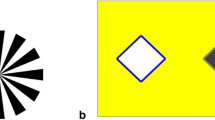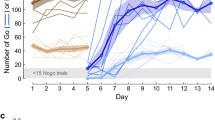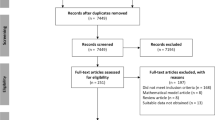Abstract
There is substantial evidence of group-specific behaviors in wild animals that are thought to be socially transmitted. Yet experimental studies with monkeys have reported conflicting evidence on the extent to which monkeys learn by observing their conspecifics. In this study, we tested the feasibility of using pre-recorded video demonstrations to investigate social learning from conspecifics in rhesus monkeys. With training, monkeys gradually learned to respond correctly following videos of a demonstrator, however, follow-up experiments revealed that this was not due to learning from the demonstrator monkey. In generalization tests with videos that were horizontally reversed, monkeys continued responding to the location they had associated with each video, rather than matching the new choice location shown in the mirrored video. When the task was changed to make location irrelevant, such that monkeys could choose correctly only by selecting the same image selected by the demonstrator in the video, observer monkeys did not exceed chance in 12,000 training trials. Because monkeys readily learn to follow nonsocial visual cues presented on a monitor to guide image choice, their inability to learn from a demonstrator here indicates substantial limitations in the capacity for social learning from videos. Furthermore, these findings encourage deeper consideration of what monkeys perceive when presented with video stimuli on computer screens.












Similar content being viewed by others
References
Adachi I, Hampton RR (2011) Rhesus monkeys see who they hear: spontaneous cross-modal memory for familiar conspecifics. PLoS ONE 6:e23345. https://doi.org/10.1371/journal.pone.0023345
Anderson JR, Gallup GG (2015) Mirror self-recognition: a review and critique of attempts to promote and engineer self-recognition in primates. Primates 56:317–326. https://doi.org/10.1007/s10329-015-0488-9
Anderson JR, Kuroshima H, Fujita K (2017) Observational learning in capuchin monkeys: a video deficit effect. Q J Exp Psychol 70:1254–1262. https://doi.org/10.1080/17470218.2016.1178312
Aron A, Aron E (1999) Statistics for psychology. Prentice Hall
Bovet D, Washburn DA (2003) Rhesus macaques (Macaca mulatta) categorize unknown conspecifics according to their dominance relations. J Comp Psychol 117:400–405. https://doi.org/10.1037/0735-7036.117.4.400
Brady RJ, Hampton RR (2018) Nonverbal working memory for novel images in rhesus monkeys. Curr Biol 28:3903-3910.e3. https://doi.org/10.1016/j.cub.2018.10.025
Brown EK, Hampton RR (2020) Cognitive control of working memory but not familiarity in rhesus monkeys (Macaca mulatta). Learn Behav 48:444–452. https://doi.org/10.3758/s13420-020-00432-7
Chang L, Fang Q, Zhang S et al (2015) Mirror-induced self-directed behaviors in rhesus monkeys after visual-somatosensory training. Curr Biol 25:212–217. https://doi.org/10.1016/j.cub.2014.11.016
Cook M, Mineka S (1990) Selective associations in the observational conditioning of fear in rhesus monkeys. J Exp Psychol Anim Behav Process 16:372–389. https://doi.org/10.1037/0097-7403.16.4.372
D’Eath RB (2007) Can video images imitate real stimuli in animal behaviour experiments? Biol Rev 73:267–292. https://doi.org/10.1111/j.1469-185X.1998.tb00031.x
Davis SJ, Vale GL, Schapiro SJ et al (2016) Foundations of cumulative culture in apes: improved foraging efficiency through relinquishing and combining witnessed behaviours in chimpanzees (Pan troglodytes). Sci Rep 6:35953. https://doi.org/10.1038/srep35953
Ferrucci L, Nougaret S, Genovesio A (2019) Macaque monkeys learn by observation in the ghost display condition in the object-in-place task with differential reward to the observer. Sci Rep 9:401. https://doi.org/10.1038/s41598-018-36803-4
Gunhold T, Whiten A, Bugnyar T (2014) Video demonstrations seed alternative problem-solving techniques in wild common marmosets. Biol Lett 10:20140439. https://doi.org/10.1098/rsbl.2014.0439
Hassett TC, Hampton RR (2017) Change in the relative contributions of habit and working memory facilitates serial reversal learning expertise in rhesus monkeys. Anim Cogn 20:485–497. https://doi.org/10.1007/s10071-017-1076-8
Isbaine F, Demolliens M, Belmalih A et al (2015) Learning by observation in the macaque monkey under high experimental constraints. Behav Brain Res 289:141–148. https://doi.org/10.1016/j.bbr.2015.04.029
Kendal RL, Boogert NJ, Rendell L et al (2018) Social learning strategies: bridge-building between fields. Trends Cogn Sci 22:651–665. https://doi.org/10.1016/j.tics.2018.04.003
Lazareva OF, Gould K, Linert J et al (2020) Smaller on the left? Flexible association between space and magnitude in pigeons (Columba livia) and blue jays (Cyanocitta cristata). J Comp Psychol 134:71–83. https://doi.org/10.1037/com0000193
Leighty KA, Menzel CR, Fragaszy DM (2008) How young children and chimpanzees (Pan troglodytes) perceive objects in a 2D display: putting an assumption to the test. Dev Sci 11:778–792. https://doi.org/10.1111/j.1467-7687.2008.00729.x
Meunier M, Monfardini E, Boussaoud D (2007) Learning by observation in rhesus monkeys. Neurobiol Learn Mem 88:243–248. https://doi.org/10.1016/j.nlm.2007.04.015
Monfardini E, Hadj-Bouziane F, Meunier M (2014) Model-observer similarity, error modeling and social learning in rhesus macaques. PLoS ONE 9:e89825. https://doi.org/10.1371/journal.pone.0089825
Mosher CP, Zimmerman PE, Gothard KM (2011) Videos of conspecifics elicit interactive looking patterns and facial expressions in monkeys. Behav Neurosci 125:639–652. https://doi.org/10.1037/a0024264
Nougaret S, Ferrucci L, Genovesio A (2019) Role of the social actor during social interaction and learning in human-monkey paradigms. Neurosci Biobehav Rev 102:242–250. https://doi.org/10.1016/j.neubiorev.2019.05.004
Parr LA, Winslow JT, Hopkins WD, de Waal FBM (2000) Recognizing facial cues: Individual discrimination by chimpanzees (Pan troglodytes) and rhesus monkeys (Macaca mulatta). J Comp Psychol 114:47–60. https://doi.org/10.1037/0735-7036.114.1.47
Paxton R, Basile BM, Adachi I et al (2010) (2010) Rhesus monkeys (Macaca mulatta) rapidly learn to select dominant individuals in videos of artificial social interactions between unfamiliar conspecifics. J Comp Psychol 1983 124:395–401. https://doi.org/10.1037/a0019751
Pokorny JJ, de Waal FBM (2009) Monkeys recognize the faces of group mates in photographs. Proc Natl Acad Sci 106:21539–21543. https://doi.org/10.1073/pnas.0912174106
Poss SR, Rochat P (2003) Referential understanding of videos in chimpanzees (Pan troglodytes), orangutans (Pongo pygmaeus), and children (Homo sapiens). J Comp Psychol 117:420–428. https://doi.org/10.1037/0735-7036.117.4.420
Potì P, Saporiti M (2010) A capuchin monkey (Cebus apella) uses video to find food. Folia Primatol (basel) 81:16–30. https://doi.org/10.1159/000277636
Renner E, Kean D, Atkinson M, Caldwell CA (2021) The use of individual, social, and animated cue information by capuchin monkeys and children in a touchscreen task. Sci Rep 11:1043. https://doi.org/10.1038/s41598-020-80221-4
Subiaul F (2007) The imitation faculty in monkeys: Evaluating its features, distribution and evolution. Jass Invit Rev J Anthropol Sci 85:35–62
Subiaul F, Cantlon JF, Holloway RL, Terrace HS (2004) Cognitive imitation in rhesus macaques. Science 305:407–410. https://doi.org/10.1126/science.1099136
Subiaul F, Renner E, Krajkowski E (2016) The comparative study of imitation mechanisms in non-human primates. In: Obhi SS, Cross ES (eds) Shared representations: sensorimotor foundations of social life. Cambridge University Press, Cambridge, pp 109–136
Templer VL, Brown EK, Hampton RR (2018) Rhesus monkeys metacognitively monitor memories of the order of events. Sci Rep 8:11541. https://doi.org/10.1038/s41598-018-30001-y
Visalberghi E, Fragaszy D (2002) “Do monkeys ape?”: ten years after. In: Dautenhahn K, Nehaniv CL (eds) Imitation in animals and artifacts. Boston Review, Cambridge, pp 471–499
Whiten A (2021) The burgeoning reach of animal culture. Science. https://doi.org/10.1126/science.abe6514
Whiten A, Horner V, Litchfield CA, Marshall-Pescini S (2004) How do apes ape? Anim Learn Behav 32:36–52. https://doi.org/10.3758/BF03196005
Whiten A, McGuigan N, Marshall-Pescini S, Hopper LM (2009) Emulation, imitation, over-imitation and the scope of culture for child and chimpanzee. Philos Trans R Soc B Biol Sci 364:2417–2428. https://doi.org/10.1098/rstb.2009.0069
Acknowledgements
We acknowledge support from the National Science Foundation (BCS-1632477; BCS-1946767) and from the National Institutes of Health’s Office of the Director, Office of Research Infrastructure Programs (P51OD011132). We would like to thank Daniel Dilks and Joseph Manns for helpful feedback throughout the project and comments on an early version of the manuscript. We would also like to thank Jessica Maaskant for assistance in creating the video stimuli for the project, and Tara Dove-VanWormer for assistance with data collection.
Author information
Authors and Affiliations
Corresponding author
Ethics declarations
Conflict of interest
The authors have no competing interests to declare.
Human and animal rights
All procedures involving animals were approved by the Emory University Institutional Animal Care and Use Committee (IACUC). The datasets generated and/or analyzed during the current study are available from the corresponding author on reasonable request.
Additional information
Publisher's Note
Springer Nature remains neutral with regard to jurisdictional claims in published maps and institutional affiliations.
Supplementary Information
Below is the link to the electronic supplementary material.
Rights and permissions
Springer Nature or its licensor holds exclusive rights to this article under a publishing agreement with the author(s) or other rightsholder(s); author self-archiving of the accepted manuscript version of this article is solely governed by the terms of such publishing agreement and applicable law.
About this article
Cite this article
Nasrini, J., Hampton, R.R. Six adult male rhesus monkeys did not learn from the choices of a conspecific shown in videos. Anim Cogn 26, 379–392 (2023). https://doi.org/10.1007/s10071-022-01669-7
Received:
Revised:
Accepted:
Published:
Issue Date:
DOI: https://doi.org/10.1007/s10071-022-01669-7




